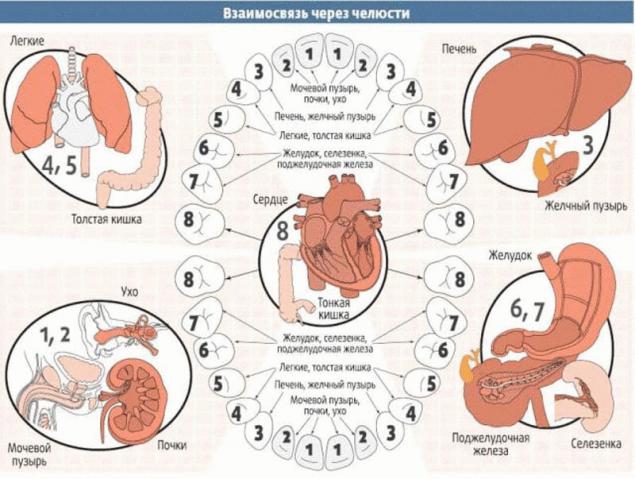3138
We read in the teeth of diseases
On the diseases of internal organs can tell not only analyzes but also ... teeth. An experienced dentist is enough to look into a patient's mouth in order to understand the condition of the heart or gastrointestinal tract.
How this method works, and whether it is possible to predict the diseases just by looking at your teeth?

Many of us are familiar feeling of unbearable toothache when, it seems, by a ruthless cutter suffer once the head, heart and stomach. Many there and "lucky", which from the appearance of caries and other dental disease does not save any quality toothpaste or therapeutic brush or rinse, or even prompt a visit to the dentist. Perhaps it is not necessary to treat the teeth and other organs? For physicians practicing metodynetraditsionnogo treatment, there are no conflicts - they know what a tooth for which authority is responsible
. How this method works, and whether it is possible to predict the diseases just by looking in your mouth?
Tit-for-tat
Many of us are familiar feeling of unbearable toothache when, it seems, by a ruthless cutter suffer once the head, heart and stomach. Many there and "lucky", which from the appearance of caries and other dental disease does not save any quality toothpaste or therapeutic brush or rinse, or even prompt a visit to the dentist. Perhaps it is not necessary to treat the teeth and other organs? For doctors practicing non-traditional methods of treatment, there are no conflicts - they know what a tooth for which authority is responsible
. So, with the gall bladder problems may result in the loss of one of the molars (back teeth seventh), and constantly aching fangs talk about the threat of cholecystitis or hepatitis. If the relationship between the teeth and other organs, and there, it is almost impossible to prove it, says academic medicine. "Any tooth being problematic, can give complication on other organs - said the surgeon-periodontist Valery Kaminsky. - But to speak of a direct relationship between each individual tooth and the body can not be specific. " Whom to believe - official medicine or conclusions of "populists" - decide for yourself, but know the position of both sides never hurts
. Keep diagnosis of teeth
Even minor damage to tooth structure can tell a lot. Of course, only an expert and detailed examination will give a complete picture of a tooth with which body and connected to a signal problem. But preliminary inspection and to compare symptoms and can hold their own (see. Table.). To do this, consider the following:
1 In the upper and lower incisors are judged on the state of the kidneys, bladder, ears, and the reproductive system. Their poor condition may be indicative of a chronic pyelonephritis, cystitis, otitis, tonsillitis, degenerative disc disease and even prostate.
2 Fangs responsible for the liver and gallbladder, signaling cholecystitis and hepatitis.
3 Small molars (premolars) - is easy and the large intestine. Problems with them can be called dysbiosis, colitis, allergies, chronic bronchitis or pneumonia.
4 large molars (molars) are associated with the stomach, spleen and pancreas. Accordingly, a list of possible provocateurs disease is: gastritis, ulcer, pancreatitis, anemia, sinusitis, tonsillitis, endocrine system disorders, atherosclerosis, varicose veins and other
. 5 Wisdom Teeth "Head" state of the heart, blood vessels and small intestine. Therefore, to help in the treatment of coronary artery disease, and even congenital heart disease may dentist. Joint pain is reflected in the condition of the front teeth of the upper and lower jaws.
"After thirty, - says Igor Molozhanov dentist - in many patients the problem starts with the gums. If a person regularly takes care of the oral cavity, and thus bleeding gums fails - we can confidently say that the problem lies in other organs. Women, for example, one of the tell-tale signs of breast pathology is the so-called irrational gingivitis (gum inflammation). Children gingivitis on the gums can manifest itself leukemia. Dentist session for session treats periodontal disease, while the child should at least do a blood test. »
Rooting - so together
If the teeth are often deteriorate due to diseases of internal organs, and there is a feedback: dental problems lead to various disorders and diseases
. It is known that tooth pain can cause terrible headaches. And unwell canines and incisors of the upper jaw haunt in the forehead and temples, and inflammation of the molars give a dull ache in the head.
Even the most common tooth decay can cause permanent migraine. Problems of periodontal (gum) contribute to the development of cardiovascular disease and pulpitis (inflammation of the dental nerve) provokes gastritis, colitis, cholecystitis.
On the Rights of officialdom
In terms of official (academic) medicine, any sore tooth, which is a hotbed of infection, so-called chronic sepsis, is a danger to the whole organism. "Problematic teeth (tooth decay, broken or dilapidated) entails a general decrease in immunity or infection outbreaks in other organs," - explains Elena Legeza dentist. But the connection between the teeth and the disease does not always provable. It is safe to say that when a tooth inflammation in the gastro-intestinal tract products come together with toxins. This causes a variety of diseases (depending on the state of the human immune system) starting from the normal and the indigestion ending gastritis. But to draw a parallel between the incisors and an osteochondrosis not undertake any dentist.
"Pain symptoms affects the entire body, - says the candidate of medical sciences Valery Kaminsky. - When a person has a toothache, followed by headache, suffering from stomach or intestines, liver, bile ducts and even the heart. The fact that tooth nerve takes the signal of the central nervous system in the brain regions and is linked to neighboring nuclei of nerve cells that respond to pain and transmit a signal to other organs. And the way the transmission of pain in every human individual. But at risk fall primarily problematic, i.e. unhealthy organs. " Therefore, if you have chronic bronchitis, do not be surprised that by running your teeth, you suddenly have earned pneumonia.
Comment
Igor Molozhanov, Head of the Department of Therapeutic Stomatology of the Kyiv Institute of Traditional Medicine
According to statistics from caries affects about 95% of people. In addition, a tooth amazed at what age and to what extent, a specialist can diagnose a patient developing a serious illness. For example, diabetes at the early stages of disease can also occur gums. A dentist may be the first physician that the sharp deterioration of gum condition diagnosed diabetes in humans.
A classic example of a communication with the internal teeth bodies - so called hepatic tooth when the stomach or liver pathologies (such as gastritis, pancreatitis, etc...) Are destroyed teeth. But dentists and other known relationship.
There are three periods of life of the teeth. Therefore, correct diagnosis depends on the patient's age.
When violations of the gastrointestinal tract and liver:
children 8-10 years, primarily affects the sixth and the front teeth (the first, second, third), in adults - first destroyed sixth and seventh teeth
. In the pathology of the respiratory system:
in children with disorders of the adenoids, tonsils and polyps suffer first, second teeth of the upper and lower jaws, at least - fangs. In adults, bronchitis, pneumonia, asthma and even reflected in the first and second teeth of both jaws.
Diseases of the urinary system:
in adolescence and up to 25 years for their answer the fourth, fifth teeth of the lower jaw. In adults - start illness fifth and sixth teeth of both jaws.
How this method works, and whether it is possible to predict the diseases just by looking at your teeth?

Many of us are familiar feeling of unbearable toothache when, it seems, by a ruthless cutter suffer once the head, heart and stomach. Many there and "lucky", which from the appearance of caries and other dental disease does not save any quality toothpaste or therapeutic brush or rinse, or even prompt a visit to the dentist. Perhaps it is not necessary to treat the teeth and other organs? For physicians practicing metodynetraditsionnogo treatment, there are no conflicts - they know what a tooth for which authority is responsible
. How this method works, and whether it is possible to predict the diseases just by looking in your mouth?
Tit-for-tat
Many of us are familiar feeling of unbearable toothache when, it seems, by a ruthless cutter suffer once the head, heart and stomach. Many there and "lucky", which from the appearance of caries and other dental disease does not save any quality toothpaste or therapeutic brush or rinse, or even prompt a visit to the dentist. Perhaps it is not necessary to treat the teeth and other organs? For doctors practicing non-traditional methods of treatment, there are no conflicts - they know what a tooth for which authority is responsible
. So, with the gall bladder problems may result in the loss of one of the molars (back teeth seventh), and constantly aching fangs talk about the threat of cholecystitis or hepatitis. If the relationship between the teeth and other organs, and there, it is almost impossible to prove it, says academic medicine. "Any tooth being problematic, can give complication on other organs - said the surgeon-periodontist Valery Kaminsky. - But to speak of a direct relationship between each individual tooth and the body can not be specific. " Whom to believe - official medicine or conclusions of "populists" - decide for yourself, but know the position of both sides never hurts
. Keep diagnosis of teeth
Even minor damage to tooth structure can tell a lot. Of course, only an expert and detailed examination will give a complete picture of a tooth with which body and connected to a signal problem. But preliminary inspection and to compare symptoms and can hold their own (see. Table.). To do this, consider the following:
1 In the upper and lower incisors are judged on the state of the kidneys, bladder, ears, and the reproductive system. Their poor condition may be indicative of a chronic pyelonephritis, cystitis, otitis, tonsillitis, degenerative disc disease and even prostate.
2 Fangs responsible for the liver and gallbladder, signaling cholecystitis and hepatitis.
3 Small molars (premolars) - is easy and the large intestine. Problems with them can be called dysbiosis, colitis, allergies, chronic bronchitis or pneumonia.
4 large molars (molars) are associated with the stomach, spleen and pancreas. Accordingly, a list of possible provocateurs disease is: gastritis, ulcer, pancreatitis, anemia, sinusitis, tonsillitis, endocrine system disorders, atherosclerosis, varicose veins and other
. 5 Wisdom Teeth "Head" state of the heart, blood vessels and small intestine. Therefore, to help in the treatment of coronary artery disease, and even congenital heart disease may dentist. Joint pain is reflected in the condition of the front teeth of the upper and lower jaws.
"After thirty, - says Igor Molozhanov dentist - in many patients the problem starts with the gums. If a person regularly takes care of the oral cavity, and thus bleeding gums fails - we can confidently say that the problem lies in other organs. Women, for example, one of the tell-tale signs of breast pathology is the so-called irrational gingivitis (gum inflammation). Children gingivitis on the gums can manifest itself leukemia. Dentist session for session treats periodontal disease, while the child should at least do a blood test. »
Rooting - so together
If the teeth are often deteriorate due to diseases of internal organs, and there is a feedback: dental problems lead to various disorders and diseases
. It is known that tooth pain can cause terrible headaches. And unwell canines and incisors of the upper jaw haunt in the forehead and temples, and inflammation of the molars give a dull ache in the head.
Even the most common tooth decay can cause permanent migraine. Problems of periodontal (gum) contribute to the development of cardiovascular disease and pulpitis (inflammation of the dental nerve) provokes gastritis, colitis, cholecystitis.
On the Rights of officialdom
In terms of official (academic) medicine, any sore tooth, which is a hotbed of infection, so-called chronic sepsis, is a danger to the whole organism. "Problematic teeth (tooth decay, broken or dilapidated) entails a general decrease in immunity or infection outbreaks in other organs," - explains Elena Legeza dentist. But the connection between the teeth and the disease does not always provable. It is safe to say that when a tooth inflammation in the gastro-intestinal tract products come together with toxins. This causes a variety of diseases (depending on the state of the human immune system) starting from the normal and the indigestion ending gastritis. But to draw a parallel between the incisors and an osteochondrosis not undertake any dentist.
"Pain symptoms affects the entire body, - says the candidate of medical sciences Valery Kaminsky. - When a person has a toothache, followed by headache, suffering from stomach or intestines, liver, bile ducts and even the heart. The fact that tooth nerve takes the signal of the central nervous system in the brain regions and is linked to neighboring nuclei of nerve cells that respond to pain and transmit a signal to other organs. And the way the transmission of pain in every human individual. But at risk fall primarily problematic, i.e. unhealthy organs. " Therefore, if you have chronic bronchitis, do not be surprised that by running your teeth, you suddenly have earned pneumonia.
Comment
Igor Molozhanov, Head of the Department of Therapeutic Stomatology of the Kyiv Institute of Traditional Medicine
According to statistics from caries affects about 95% of people. In addition, a tooth amazed at what age and to what extent, a specialist can diagnose a patient developing a serious illness. For example, diabetes at the early stages of disease can also occur gums. A dentist may be the first physician that the sharp deterioration of gum condition diagnosed diabetes in humans.
A classic example of a communication with the internal teeth bodies - so called hepatic tooth when the stomach or liver pathologies (such as gastritis, pancreatitis, etc...) Are destroyed teeth. But dentists and other known relationship.
There are three periods of life of the teeth. Therefore, correct diagnosis depends on the patient's age.
When violations of the gastrointestinal tract and liver:
children 8-10 years, primarily affects the sixth and the front teeth (the first, second, third), in adults - first destroyed sixth and seventh teeth
. In the pathology of the respiratory system:
in children with disorders of the adenoids, tonsils and polyps suffer first, second teeth of the upper and lower jaws, at least - fangs. In adults, bronchitis, pneumonia, asthma and even reflected in the first and second teeth of both jaws.
Diseases of the urinary system:
in adolescence and up to 25 years for their answer the fourth, fifth teeth of the lower jaw. In adults - start illness fifth and sixth teeth of both jaws.
Small apartment: optimizing space in 9 steps
Electric "Bumblebee" - the development of a scientist from Krivoy Rog
























